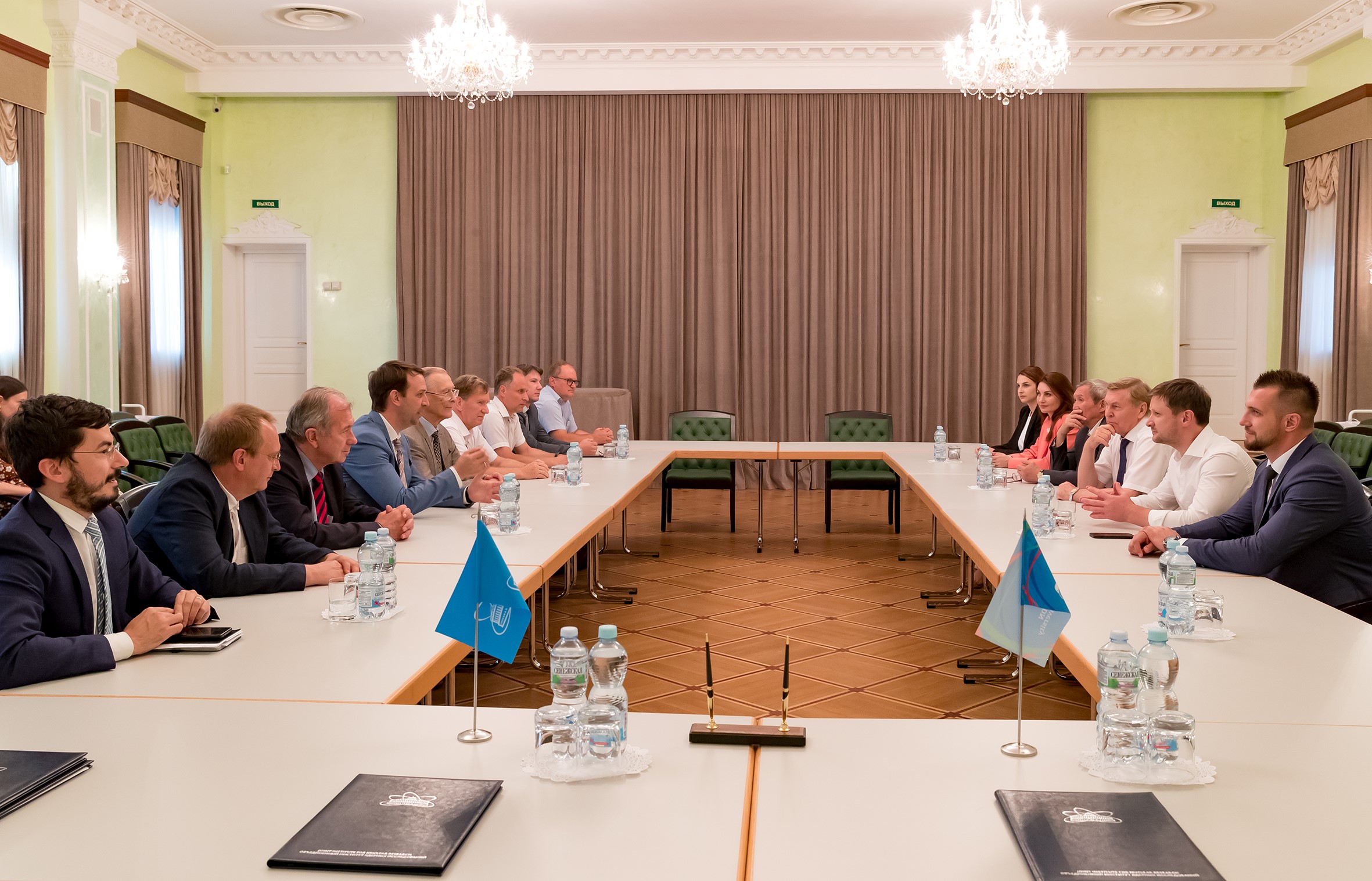JINR and RUDN University signed cooperation agreement

JINR Director Academician Grigory Trubnikov and RUDN Rector Oleg Yastrebov signed the agreement in the presence of JINR Scientific Leader Victor Matveev and RUDN President Vladimir Filippov.
“RUDN is the flagship of international scientific and technical cooperation for the Russian Federation. When mentioning the JINR’s location country, new partners of the Institute often recall the RUDN University. We have a long history of cooperation, and now we are giving it a new impetus,” JINR Director Grigory Trubnikov noted.
“We are really similar: 62 countries are partners of JINR. Our University educates students from 160 countries, and RUDN graduates work all over the world. I believe that there must be our maths and physics graduates in your scientific teams. I find it a kind of an interface point thanks to which we will further develop scientific and educational cooperation. There are great prospects for cooperation between JINR and our Physics and Mathematics Department, Academy of Engineering, Institute of Medicine, with which you have already begun cooperation. I hope for fruitful, long-term, and successful cooperation enhancement,” RUDN Rector Oleg Yastrebov said.
JINR and the RUDN University have agreed to hold regular joint basic and applied studies, as well as integrate scientific-educational and scientific-research programmes thus improving personnel training. Joint training of staff, students, postgraduates of the RUDN University is planned in the following scientific areas: particle physics and nuclear physics, condensed matter physics, theoretical and mathematical physics, mathematical modelling and computing physics, networks, computer technologies, life sciences.
Both organizations noted the importance of the joint development of science diplomacy. The Joint Institute for Nuclear Research has been a space for open scientific dialogue between representatives of various countries for over 50 years. It has become a significant centre of competence in science diplomacy for both its location country and the JINR Member States. The Institute is considering the possibility of creating a high-level international forum in Dubna that is intended to become a “Davos” of science diplomacy. The RUDN leaders supported this initiative and noted the significant relevant potential of the University. JINR and the RUDN University noted the necessity to closely work with scientific attaches and agreed to consider the creation of an attaches club.
Moreover, the parties discussed the development of the double degree programme of the RUDN University and foreign universities with the participation of JINR as a site for student internships and preparation of qualifying research papers. They also discussed the participation of the Institute’s scientists in RUDN educational programmes, as well as crediting of disciplines for diplomas issued by universities of the JINR Member States and Associate Members.
“The RUDN University and JINR have great potential for cooperation in some areas, some of which we have already discussed. The first litmus example of cooperation may be the Laboratory of Information Technologies. We have been cooperating with its Director Vladimir Korenkov for several decades. There are joint publications, conferences, consultations. However, it is necessary to consider how to attract our students studying IT, mathematics, and physics to the Institute. In addition, an important step would be the training of RUDN students at unique scientific equipment of JINR,” RUDN President Vladimir Filippov said.
The RUDN delegation visited the Laboratory of High Energy Physics where the RUDN representatives learned about the progress in the implementation of the NICA mega-project and visited the factory of superconducting magnets. Moreover, the programme of the visit included workshops at the Nanocentre of the Laboratory of Nuclear Reactions and the Laboratory of Information Technologies.
Sergey Ivanov, a scientist from St. Petersburg, became the first winner of the RUDN University International Prize for scientific achievements and merits in the field of mathematics in the amount of 5 million rubles.
Egyptian scientist Abdelraouf Masoud Ali, associate professor at the Department of Environmental Management, Institute of Environmental Engineering, has been awarded the 2024 Egyptian State Incentive Prize in Agricultural Sciences.
Inventors from 26 countries and 35 regions of Russia presented more than 500 projects at the XVIII Moscow International Salon of Inventions and Innovative Technologies “Archimedes”. 340 projects belong to Russian participants, and their foreign colleagues — 215. RUDN University initiatives were awarded two gold medals.
Sergey Ivanov, a scientist from St. Petersburg, became the first winner of the RUDN University International Prize for scientific achievements and merits in the field of mathematics in the amount of 5 million rubles.
Egyptian scientist Abdelraouf Masoud Ali, associate professor at the Department of Environmental Management, Institute of Environmental Engineering, has been awarded the 2024 Egyptian State Incentive Prize in Agricultural Sciences.
Inventors from 26 countries and 35 regions of Russia presented more than 500 projects at the XVIII Moscow International Salon of Inventions and Innovative Technologies “Archimedes”. 340 projects belong to Russian participants, and their foreign colleagues — 215. RUDN University initiatives were awarded two gold medals.